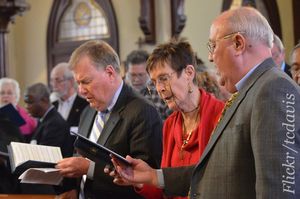Two days after the Waco holocaust on 19 April 1993, a newspaper interviewed Graham Baldwin, a former London University chaplain, who had previously helped to bring approximately 200 people out of various cults. With an eye partly on Waco, Baldwin remarked, ‘It is no good people saying that everybody has a right to join any religion they like. I agree with that entirely, but people who join a cult do not know what they are getting into. They do not know that their freedom will be taken away’ (Western Mail, 21 April 1993, p.8).
Key concept
Freedom is a key concept in the contemporary cults debate, and this is the subject of this month’s ‘lesson from Waco’. Related to freedom are the claims of brainwashing or mind-control techniques with regard to cults like Scientology, the Unification Church (‘Moonies’) or the International Church of Christ. But we can come closer to home. A growing number of Exclusive Brethren ex-members complain they were prevented from talking to close relatives and friends. They were then banned from attending meetings if they did not respond positively to their leaders’ rigid directions concerning their lives.

For example, members of this group are not allowed to mix freely with other Christians or work or study with non-Christians. Nor are they supposed to own ‘worldly’ things; a TV, a sports car and a speedboat are just a few of the many forbidden items! One ex-member reports: ‘We are concerned that there is a controlling elite within the Brethren who have tremendous power over people’s lives. The way they break up families and friendships is very cruel’ (Western Mail, 28 April 1993, p.1).
Response
A natural response is that of anger and protest, with a demand for restrictions (or even a total ban) to be placed on the activities of groups which threaten personal liberty. That was how many responded to the Waco incident. ‘Why didn’t someone stop that lunatic sooner?’ was their cry. Some governments have intervened on occasions to restrict or ban specific cults. In the 1970s the UK government imposed a one-year ban on all overseas members of Scientology seeking to work at centres in Britain.
The question of restricting or prohibiting cult activities is a complex one. In the USA, for example, the First Amendment to the Constitution states: ‘Congress shall make no law respecting an establishment of religion, or prohibiting the free exercise thereof…’ Freedom of belief is guaranteed to all, no matter how crazy their religious beliefs may be.
Article 9 of The European Convention on Human Rights (1953) is emphatic: ‘Everyone has the right to freedom of thought, conscience and religion … including freedom to change his religion or belief, and freedom, either alone or in community with others, and in public or private, to manifest his religion or belief, in worship, teaching, practice and observance.’ It could not be clearer.

The United Nations Resolution of 1981 is even more extensive, for it eliminates all intolerance and discrimination based on religion. This resolution eloquently upholds the equality of all people before the law and their right to freedom of thought, conscience, religion, belief and the right of assembly together with their charitable institutions and teaching. Sadly, in many countries the UN Resolution is not applied for a variety of reasons. And only in recent years have countries like Italy, Spain, Portugal and Greece given concessions and legal rights to evangelical Christians as well as to cults.
Unacceptable practices
But, if we honour the principle of religious liberty, is it possible to prohibit religious practices, which are deemed unacceptable? It is possible, especially if those practices distress or threaten other citizens and tend to undermine the state. For example, Christian Science has come under scrutiny for discouraging members and their children from seeking medical treatment, while the ‘Family of Love’ were investigated for encouraging sex between adults and children. In October 1994 the British Injuries Compensation Board awarded £5,000 to a teenage girl who had been abused from the age of three by members of this cult.
Other unacceptable practices include the financial exploitation of innocent victims by cults like Scientology, and the prohibition of blood transfusions by the Watchtower Society, a prohibition which endangers the lives of many Jehovah’s Witnesses.
Tolerance
If specific cultic practices are prohibited, freedom of thought and religious belief should still be upheld. This means an attitude of tolerance in the sense of leaving people free to believe what they want. Democratic and secular states like the United States and Japan provide the greatest degree of tolerance, while liberal, democratic countries like Britain, France and Sweden are only slightly less tolerant.
Stunned by news that forty-eight cult members of the Order of the Solar Temple had been found dead in Switzerland in October 1994, some continental governments have been reviewing their legislation concerning minority religious groups. This review inevitably affects Protestant evangelical groups as well as cults.
A new law in Austria, for example, became effective early in 1998 requiring that any group seeking state registration should have 16,000 members, instead of the previous figure of 400. Some Swiss cantons continue to discuss measures for limiting the public activities of cults and the restriction of the use of the term ‘church’ only to denominations and groups approved by their police and justice departments.
This raises serious questions. Our forefathers struggled over a long period in the West, especially in seventeenth-century Britain, to establish the right to religious freedom for all citizens. We must pray as well as work to protect this principle of religious freedom. Civil leaders do need our prayers and it is our duty to pray for them (1 Timothy 2:1-5).
This need for prayer is also seen in the context of the Waco incident. The situation could have been handled better, possibly avoiding such a tragic ending. None of the FBI agents or Justice Department officials attempted to understand Koresh’s mind-set or listen seriously to his ‘preaching’. A sense of deep frustration developed and an abrupt policy change was introduced when the FBI began its ‘stress escalation’ and harassment techniques which only further alienated Koresh and his community. These details are well documented and make sad reading.
Brainwashing
What about the controversial charge of brainwashing with regard to cults? Are techniques of mind control used to destroy critical ability among devotees? A distinguished clinical psychologist, Professor Margaret Singer, gave evidence for the Daily Mail in the ‘Moonie’ libel trial in 1981. Objecting to an article in the newspaper in 1978, accusing them of brainwashing converts and breaking up families, the Unification Church lost the case and had to pay almost £1 million costs.
Allegations made by the newspaper against the ‘Moonies’ were five-fold. One, ‘sophisticated mind control techniques’ are used including low-protein diets, sleep deprivation, ‘love bombing’ (reassurance of love and care) and ‘sugar-buzzing’ (increasing blood sugar levels to confuse the brain). Two, recruits had a ‘perpetual vapid smile’ and vacant look. Three, they are ‘programmed’ into a huge, fund-raising army. Four, their motivation was as strong as that of Communists. Five, the cult raises vast sums of money through deception.
Drop-out rate
With regard to cults in general, Professor Singer argued that most ex-cult members, on leaving the cult, struggle with problems such as depression, meaninglessness, loneliness, indecisiveness, uncritical passivity and a deep fear of judgement, even recriminations. On the other hand, we must acknowledge that there is a large drop-out rate from the cults although some members claim to have found stimulation, purpose and fulfilment in a particular cult.
Furthermore, in their search for a ‘faith’, many individuals try different options until they find one they like. Interestingly, some cult workers are cautioned at times by leaders for being overzealous in pressurising or brainwashing individuals. Authoritarianism, financial and emotional exploitation, then deception, are the more common criticisms made by new members inside a cult.
Greatest need
The dangers are real and some people suffer extensively through cult involvement. A tension exists between upholding religious freedom and protecting society from exploitation and deception. There is a constant need for vigilance and prayer. But there is a further challenge. The greatest need of people is for freedom, but the freedom they should be seeking is from eternal punishment for their sins and the tyranny of sin in their lives. And only in Jesus Christ can that need be met. He, and he alone, died as a substitute to free sinners from hell and reconcile them to God. ‘So if the Son sets you free, you will be free indeed’ (John 8:36).

![Waco and religious liberty [4]](/content/images/size/w300/wp-content/uploads/1999/03/Mount-Carmel-fire-Waco-Branch-Davidians-Koresh-SOURCE-Wikipedia.jpg)















